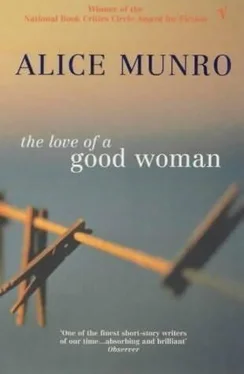Alice Munro - The Love Of A Good Woman
Здесь есть возможность читать онлайн «Alice Munro - The Love Of A Good Woman» весь текст электронной книги совершенно бесплатно (целиком полную версию без сокращений). В некоторых случаях можно слушать аудио, скачать через торрент в формате fb2 и присутствует краткое содержание. Жанр: Современная проза, на английском языке. Описание произведения, (предисловие) а так же отзывы посетителей доступны на портале библиотеки ЛибКат.
- Название:The Love Of A Good Woman
- Автор:
- Жанр:
- Год:неизвестен
- ISBN:нет данных
- Рейтинг книги:4 / 5. Голосов: 1
-
Избранное:Добавить в избранное
- Отзывы:
-
Ваша оценка:
- 80
- 1
- 2
- 3
- 4
- 5
The Love Of A Good Woman: краткое содержание, описание и аннотация
Предлагаем к чтению аннотацию, описание, краткое содержание или предисловие (зависит от того, что написал сам автор книги «The Love Of A Good Woman»). Если вы не нашли необходимую информацию о книге — напишите в комментариях, мы постараемся отыскать её.
The Love Of A Good Woman — читать онлайн бесплатно полную книгу (весь текст) целиком
Ниже представлен текст книги, разбитый по страницам. Система сохранения места последней прочитанной страницы, позволяет с удобством читать онлайн бесплатно книгу «The Love Of A Good Woman», без необходимости каждый раз заново искать на чём Вы остановились. Поставьте закладку, и сможете в любой момент перейти на страницу, на которой закончили чтение.
Интервал:
Закладка:
“Son of a gun,” these boys said. With gathering energy and a tone of deepening respect, even of gratitude. “ Son of a gun. ”
It was their first time out this year. They had come across the bridge over the Peregrine River, the single-lane double-span bridge known locally as Hell’s Gate or the Death Trap-though the danger had really more to do with the sharp turn the road took at the south end of it than with the bridge itself.
There was a regular walkway for pedestrians, but they didn’t use it. They never remembered using it. Perhaps years ago, when they were so young as to be held by the hand. But that time had vanished for them; they refused to recognize it even if they were shown the evidence in snapshots or forced to listen to it in family conversation.
They walked now along the iron shelf that ran on the opposite side of the bridge from the walkway. It was about eight inches wide and a foot or so above the bridge floor. The Peregrine River was rushing the winter load of ice and snow, now melted, out into Lake Huron. It was barely back within its banks after the yearly flood that turned the flats into a lake and tore out the young trees and bashed any boat or hut within its reach. With the runoff from the fields muddying the water and the pale sunlight on its surface, the water looked like butterscotch pudding on the boil. But if you fell into it, it would freeze your blood and fling you out into the lake, if it didn’t brain you against the buttresses first.
Cars honked at them-a warning or a reproof-but they paid no attention. They proceeded single file, as self-possessed as sleepwalkers. Then, at the north end of the bridge, they cut down to the flats, locating the paths they remembered from the year before. The flood had been so recent that these paths were not easy to follow. You had to kick your way through beaten-down brush and jump from one hummock of mud-plastered grass to another. Sometimes they jumped carelessly and landed in mud or pools of leftover floodwater, and once their feet were wet they gave up caring where they landed. They squelched through the mud and splashed in the pools so that the water came in over the tops of their rubber boots. The wind was warm; it was pulling the clouds apart into threads of old wool, and the gulls and crows were quarrelling and diving over the river. Buzzards were circling over them, on the high lookout; the robins had just returned, and the red-winged blackbirds were darting in pairs, striking bright on your eyes as if they had been dipped in paint.
“Should’ve brought a twenty-two.”
“Should’ve brought a twelve-gauge.”
They were too old to raise sticks and make shooting noises. They spoke with casual regret, as if guns were readily available to them.
They climbed up the north banks to a place where there was bare sand. Turtles were supposed to lay their eggs in this sand. It was too early yet for that to happen, and in fact the story of turtle eggs dated from years back-none of these boys had ever seen any. But they kicked and stomped the sand, just in case. Then they looked around for the place where last year one of them, in company with another boy, had found a cow’s hipbone, carried off by the flood from some slaughter pile. The river could be counted on every year to sweep off and deposit elsewhere a good number of surprising or cumbersome or bizarre or homely objects. Rolls of wire, an intact set of steps, a bent shovel, a corn kettle. The hipbone had been found caught on the branch of a sumac-which seemed proper, because all those smooth branches were like cow horns or deer antlers, some with rusty cone tips.
They crashed around for some time-Cece Ferns showed them the exact branch-but they found nothing.
It was Cece Ferns and Ralph Diller who had made that find, and when asked where it was at present Cece Ferns said, “Ralph took it.” The two boys who were with him now-Jimmy Box and Bud Salter-knew why that would have to be. Cece could never take anything home unless it was of a size to be easily concealed from his father.
They talked of more useful finds that might be made or had been made in past years. Fence rails could be used to build a raft, pieces of stray lumber could be collected for a planned shack or boat. Real luck would be to get hold of some loose muskrat traps. Then you could go into business. You could pick up enough lumber for stretching boards and steal the knives for skinning. They spoke of taking over an empty shed they knew of, in the blind alley behind what used to be the livery barn. There was a padlock on it, but you could probably get in through the window, taking the boards off it at night and replacing them at daybreak. You could take a flashlight to work by. No-a lantern. You could skin the muskrats and stretch the pelts and sell them for a lot of money.
This project became so real to them that they started to worry about leaving valuable pelts in the shed all day. One of them would have to stand watch while the others went out on the traplines. (Nobody mentioned school.)
This was the way they talked when they got clear of town. They talked as if they were free-or almost free-agents, as if they didn’t go to school or live with families or suffer any of the indignities put on them because of their age. Also, as if the countryside and other people’s establishments would provide them with all they needed for their undertakings and adventures, with only the smallest risk and effort on their part.
Another change in their conversation out here was that they practically gave up using names. They didn’t use each other’s real names much anyway-not even family nicknames such as Bud. But at school nearly everyone had another name, some of these having to do with the way people looked or talked, like Goggle or Jabber, and some, like Sore-arse and Chickenfucker, having to do with incidents real or fabulous in the lives of those named, or in the lives-such names were handed down for decades-of their brothers, fathers, or uncles. These were the names they let go of when they were out in the bush or on the river flats. If they had to get one another’s attention, all they said was “Hey.” Even the use of names that were outrageous and obscene and that grown-ups supposedly never heard would have spoiled a sense they had at these times, of taking each other’s looks, habits, family, and personal history entirely for granted.
And yet they hardly thought of each other as friends. They would never have designated someone as a best friend or a next-best friend, or joggled people around in these positions, the way girls did. Any one of at least a dozen boys could have been substituted for any one of these three, and accepted by the others in exactly the same way. Most members of that company were between nine and twelve years old, too old to be bound by yards and neighborhoods but too young to have jobs-even jobs sweeping the sidewalk in front of stores or delivering groceries by bicycle. Most of them lived in the north end of town, which meant that they would be expected to get a job of that sort as soon as they were old enough, and that none of them would ever be sent away to Appleby or to Upper Canada College. And none of them lived in a shack or had a relative in jail. Just the same, there were notable differences as to how they lived at home and what was expected of them in life. But these differences dropped away as soon as they were out of sight of the county jail and the grain elevator and the church steeples and out of range of the chimes of the courthouse clock.
On their way back they walked fast. Sometimes they trotted but did not run. Jumping, dallying, splashing, were all abandoned, and the noises they’d made on their way out, the hoots and howls, were put aside as well. Any windfall of the flood was taken note of but passed by. In fact they made their way as adults would do, at a fairly steady speed and by the most reasonable route, with the weight on them of where they had to go and what had to be done next. They had something close in front of them, a picture in front of their eyes that came between them and the world, which was the thing most adults seemed to have. The pond, the car, the arm, the hand. They had some idea that when they got to a certain spot they would start to shout. They would come into town yelling and waving their news around them and everybody would be stock-still, taking it in.
Читать дальшеИнтервал:
Закладка:
Похожие книги на «The Love Of A Good Woman»
Представляем Вашему вниманию похожие книги на «The Love Of A Good Woman» списком для выбора. Мы отобрали схожую по названию и смыслу литературу в надежде предоставить читателям больше вариантов отыскать новые, интересные, ещё непрочитанные произведения.
Обсуждение, отзывы о книге «The Love Of A Good Woman» и просто собственные мнения читателей. Оставьте ваши комментарии, напишите, что Вы думаете о произведении, его смысле или главных героях. Укажите что конкретно понравилось, а что нет, и почему Вы так считаете.












